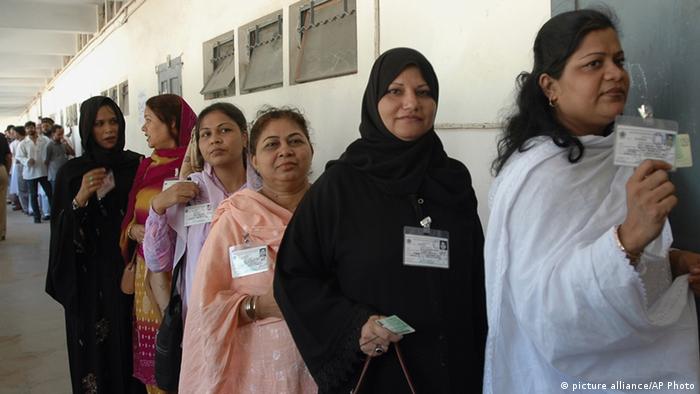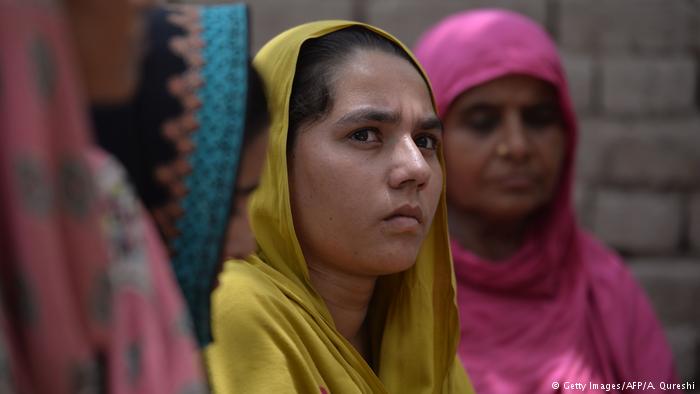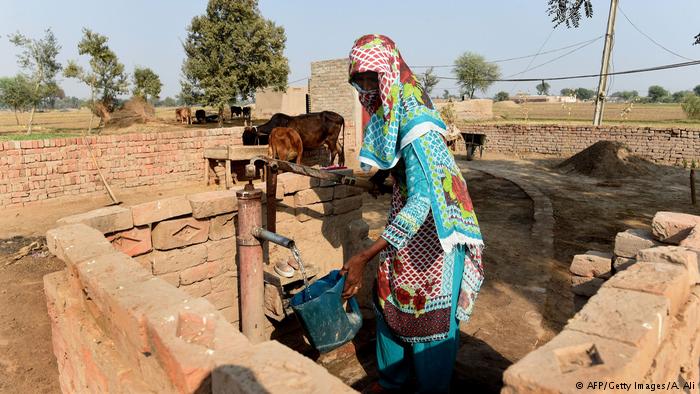“Siyasut main barabri mera haq”
 The sentence, “Siyasut main barabri mera haq” means, equality in politics is my right. In Pakistan, when it comes to women, politics and voting, the picture looks bleak. For instance according to this report by FAFEN (Fair and Free Election Network), a gender analysis was conducted, revealing startling results. Out of a total number of 4,671 candidates contesting for National Assembly seats in the 2013 elections in Pakistan, there are only 161 women contesting for the elections – or just 3.5% of the candidates are female! An alarmingly low number.
The sentence, “Siyasut main barabri mera haq” means, equality in politics is my right. In Pakistan, when it comes to women, politics and voting, the picture looks bleak. For instance according to this report by FAFEN (Fair and Free Election Network), a gender analysis was conducted, revealing startling results. Out of a total number of 4,671 candidates contesting for National Assembly seats in the 2013 elections in Pakistan, there are only 161 women contesting for the elections – or just 3.5% of the candidates are female! An alarmingly low number.
Representation (or female representation, to be precise), unfortunately, is only half the story.
The other side, that is female voters or the number of women who actually go out to cast their votes, presents an equally dreary picture.
Women in Pakistan, especially those belonging to rural areas, are discouraged to vote. Despite the fact that women represent about 43% of the roughly 86 million registered voters (ECP data), the female turnout during the elections in the past has always been very low.
“It’s the will of my husband. This is the decision of all the families.” says Fatima Shamshad, a woman from a village called Mateela, located just 160 kms away from Islamabad – perhaps the hub of all election activities in the days that follow the election. A village, where according to this Dawn report, ‘not a single woman has voted for decades, and aren’t likely to in the May 11 elections either!’
What’s even more startling is that Mateela is one of 564 out of the 64,000 polling districts across Pakistan where not a single woman voted in the country’s 2008 election!
And while the statistics might be slightly better for Punjab and Sindh, they are downright appalling in conservative areas of the Khyber Pakhtunkhwa and Balochistan provinces.
As a result, there are many civil sector, non-government and social sector organizations that are working tirelessly to not only increase female representation in the parliament and the national assembly, they are also actively playing a huge part in spreading awareness regarding why it is important for women to become active participants in the political process of their country – starting from their right to vote!
Two such organizations are, of course, Uks Research Center, and Fredrich Ebert Stiftung (FES) Pakistan.
Through their partnership and as part of their ongoing collaboration, both these social sector organizations – both of whom have been working on similar issues in Pakistan for a good amount of time now – have produced a series of radio programs, with the theme ‘Siyasut Main Barabari Mera Haq’ (English: Equality in politics is my right!).
The aim of this series is to empower women as far as the political process of the country is concerned, so that they can become active contributors to the progress, prosperity and development of their country Pakistan, as well as improving the media’s role in enhancing the role played by women politicians. Both of which are essential for a true ‘democracy’ to function!
I had the distinct pleasure of listening to one such program, titled ‘Female Participation in Baluchistan’, which of course speaks about the participation (or lack thereof) of women in the political process in the province of Baluchistan.
Baluchistan is, by far, the most conservative province of Pakistan. Marred by underdevelopment, it is one of the most marginalized areas of Pakistan, where there has been little to none female political participation.
The program speaks about the participation of women in the upcoming 2013 elections in Pakistan in the province of Baluchistan. Naqeebullah Tareen from Quetta, the capital of Baluchistan, reports that gender discrimination, particularly when it comes to politics and political participation, is rampant in this province.
He speaks of the need for giving women a permanent role in Pakistani politics, rather than the temporary and insignificant roles that they have been given since time immemorial.
Professor Hussan Ara Magsi, from the department of politics at the University of Baluchistan, adds that the whole purpose of bringing women into politics is that there needs to be an equal representation of both genders within the political parties, as well as the parliament. She says that the discrimination against women in politics calls for a change in mindsets.
She adds that like many other countries in the world, women need to have an equal say in matters related to policy-making, and that certain departments such as social welfare and education should actually have majority women representation.
Professor Magsi adds that women have not been given the same amount of political training that men in Pakistan have received. However despite this and all the other challenges, women in Pakistan have still held important positions, such as being the Prime Minister of the country, as well as the Foreign Minister of the country – referring of course to Benazir Bhutto and Hina Rabbani Khar respectively.
Analyst Majeed Afzal reports that things have improved, and now, women are actively participating in the political process in Baluchistan. “Women are now more actively participating in politics” he says. “Not only is there a surge in independent women candidates, political parties are now also more willing to give women representation” he adds. “As a result, women from Baluchistan have gone on to hold important positions, such as members of Senate and National Assembly, for instance”.
He adds that times have changed for the better!
Indeed, many organizations in Pakistan, with the help of foreign agencies, have played a big role in mobilizing women voters, educating them to exercise their right to vote, and become a part of the electoral process. After the 2008 elections in Pakistan, it was determined that the 3 biggest reasons behind the lack of female participation in the elections in the rural areas were (a) women not having CNIC’s, (b) the overall security situation in Pakistan, and (c) lack of female-only polling stations.
Since then however, many civil sector organizations have been working on engaging with these communities and educating them in order to increase female voter mobilization – and it is expected that the 2013 General Elections in Pakistan will see much-improved numbers as far as female voters are concerned.
For instance because of the collaborative work being done by organizations such as STAEP (Supporting Transparency, Accountability and Electoral Processes), FAFEN (Free and Fair Elections Network) and The Asia Foundation, it is expected that the voter turnout in the 2013 elections may have increase by 2 million voters, with most of these being female voters.
Some analysts and observers however still believe that women are not given proper representation in the long-term planning of Pakistan, but in fact certain rules and regulations ago against women, their beliefs and their thoughts. These analysts also believe that things seem to be changing for the better now, and that thanks to the efforts being made by civil sector organizations as well as the media, more and more women are being given party tickets. For instance Prof. Dr. Mughees-ud-Din Sheikh, ex-chairperson of the Department of Journalism at the University of Punjab says that speaking generally, women have a much better standing in Pakistan as far as politics is concerned, when compared to countries like India or the US.
Speaking about the opportunities (or rather the lack of opportunities) given to women by political parties, Dr. Shama says that within the political parties, there is no merit-based allocation unfortunately, which becomes a huge barrier when it comes to women entering the political process. She says that things needs to seriously change in a society where the traditional mindset dictates that women are supposed to stay inside the home, take care of household chores and the kids, regardless of how educated she might be.
If politicians are serious about giving women an equal say in the political process of Pakistan, and giving them their just right to contribute towards the success and development of this country, they must abolish the ‘women wings’ in their parties and instead give women important roles within their parties as well as have them contest the elections on general party seats.
Contrary to what Mr. Afzal said, Dr. Shama says that things have actually taken a turn for the worse in Baluchistan, especially in the last 5 years. She goes on to make some very interesting points on why this is so.
Women in Pakistan and in particular in the province of Baluchistan need to use their right to vote in order to be heard and have their say in the politics of Pakistan, to bring change, and to become active participants in the politics of their country. After all, it is their right! And until and unless this happens, they will not be properly represented within the political parties or on the government-level.
Women of Pakistan need to realize that they can become empowered members of the society by taking an active part in the political process of Pakistan. In provinces such as Baluchistan, however, there is a strong need to train women and make them aware of this fundamental right that they have. The media, in particular, can play a pivotal role here, and needs to play its part as well. For starters, the media – both electronic and print – should give female politicians more coverage.
This radio program series produced by Uks Research Center, in collaboration with FES, is such one effort which has been started for the benefit of women, women in politics, and the people of Pakistan in general. I highly urge everyone reading this to give this excellent radio program series ‘Siyasut Main Barabari Mera Haq’ a listen!
You can easily get in touch with said organizations via email (info@uksresearch.com or info@fes-pakistan.org) or via phone (+92-51-2850906). The radio program series can also be heard on Uks’s website at www.uksresearch.com.
Author: Ahmad Ibrahim Sayed
About The Author:
Ahmad Ibrahim Sayed is a business graduate based in Islamabad, Pakistan, who is working as a SEO/SEM Specialist and a freelance writer with a California-based software solutions firm, having previously worked at Uks Research Center as a Research Associate.






